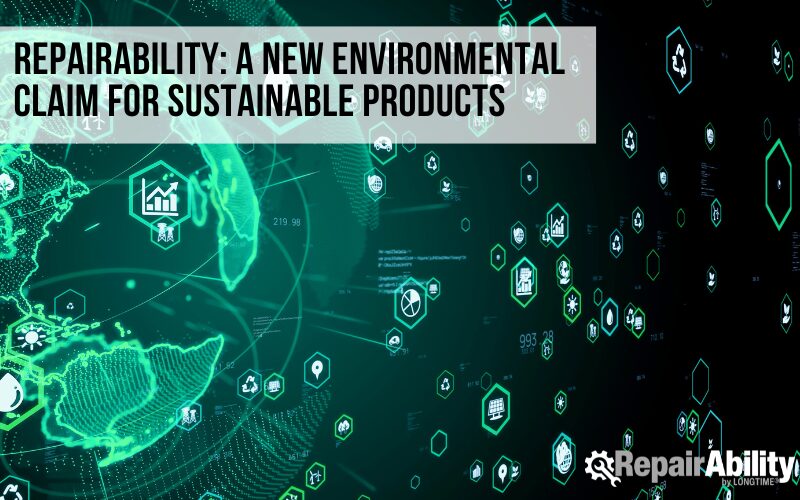
Repairability: a new environmental claim for sustainable products
As the environmental impact of products faces increasing scrutiny, repairability has emerged as a key criterion for sustainability. As a label dedicated to responsible consumption, LONGTIME® highlights repairability to encourage the selection of durable, repairable products. This evolving environmental claim enables consumers to prioritize longevity, thus reducing waste and minimizing ecological footprints.
What is an environmental claim?
An environmental claim is a statement indicating that a product or service has a reduced or positive impact on the environment. These claims can take various forms, such as labels, terms (e.g., “eco-friendly”), graphics, or descriptions of a product’s ecological impact.
For claims to be credible, they must be clear and substantiated with reliable data, typically supported by third-party evaluations. This ensures the accuracy of the statements and avoids misleading practices. The framework governing these claims is shaped by European regulations, aiming to protect consumers and promote informed, sustainable consumption.
Regulatory framework for environmental claims
To ensure the transparency and reliability of environmental claims, several standards and regulations are in place:
- ISO 14021: This standard outlines the criteria for environmental self-declarations, requiring clear evidence to avoid misleading claims. It covers terms like “recyclable” or “eco-designed.”
- Green Claims Directive (EU): Enforced in 2023, this directive strengthens evidence requirements for environmental claims and imposes penalties for unsupported statements.
- AGEC Law (France): The French Anti-Waste Law mandates specific guidelines for environmental claims and strengthens penalties for greenwashing.
- Other Standards and Labels: Labels like LONGTIME® ensure products are evaluated for durability and sustainability, supporting transparent environmental practices.
Repairability: a guarantee of durability
Repairability is becoming a key selling point for brands as it meets consumer demand for durable, cost-effective products. Offering repairable items not only helps reduce waste but also positions companies as responsible players in the circular economy. This approach is in line with the new regulations and demonstrates a commitment to sustainability.
Environmental benefits of repairability
Non-repairable items often end up in landfills, contributing to electronic waste and pollution. Repairability reduces this impact by allowing consumers to extend the life of products, thereby preserving natural resources and supporting waste reduction.
Repairability and the circular economy
Repairability plays a central role in the circular economy, which promotes product reuse and recycling. By offering products that can be repaired, companies help shift away from the traditional “produce, consume, dispose” model, encouraging more sustainable practices.
Examples of repairable products
- Smartphones: Fairphone’s modular design allows users to replace components such as the battery or screen, promoting long-term use.
- Home Appliances: Brands like Miele and Whirlpool design washing machines with accessible parts for easy repairs.
- Computers: Framework laptops are designed for easy disassembly, allowing users to upgrade or replace individual components.
Why repairability is crucial for brands
Repairability has become a competitive advantage for brands, aligning with consumer preferences for long-lasting products. Brands that guarantee repairability reinforce their commitment to sustainability, gaining customer loyalty and supporting eco-conscious values.
Labels and certifications ensuring repairability
Several labels and certifications guarantee the repairability of products, contributing to sustainable consumption. Here are some prominent examples:
- Repairability Index: In France, this index rates electronic and household products on a scale from 1 to 10, based on their repairability. It helps consumers choose products that are built to last.
- LONGTIME® Label: The LONGTIME® label ensures that products meet durability and repairability standards, simplifying maintenance and repairs.
- Eco-Label: Certain ecological certifications, such as TCO Certified, include repairability criteria, encouraging manufacturers to design products that are both repairable and recyclable.
Ensuring the credibility of environmental claims
Transparency and audits are essential for verifying environmental claims. Here’s why they matter:
Credibility and Trust: Consumers are increasingly wary of environmental claims due to the prevalence of greenwashing. Independent audits and certifications validate claims, boosting consumer confidence.
Regulatory Compliance: With strict regulations governing environmental claims, audits ensure companies meet required standards, reducing the risk of penalties.
Continuous Improvement: Audits provide valuable insights into a company’s environmental practices, driving improvements in production, supply chains, and waste management.
Data Transparency: Clear, verifiable data on a product’s environmental impact allows stakeholders to make informed decisions and encourages brands to adopt more sustainable practices.
In conclusion, repairability is not just a feature of sustainable products—it is a defining element of the future of consumption. By aligning with regulations, certifications, and consumer expectations, brands can build trust and contribute to a more sustainable world.
